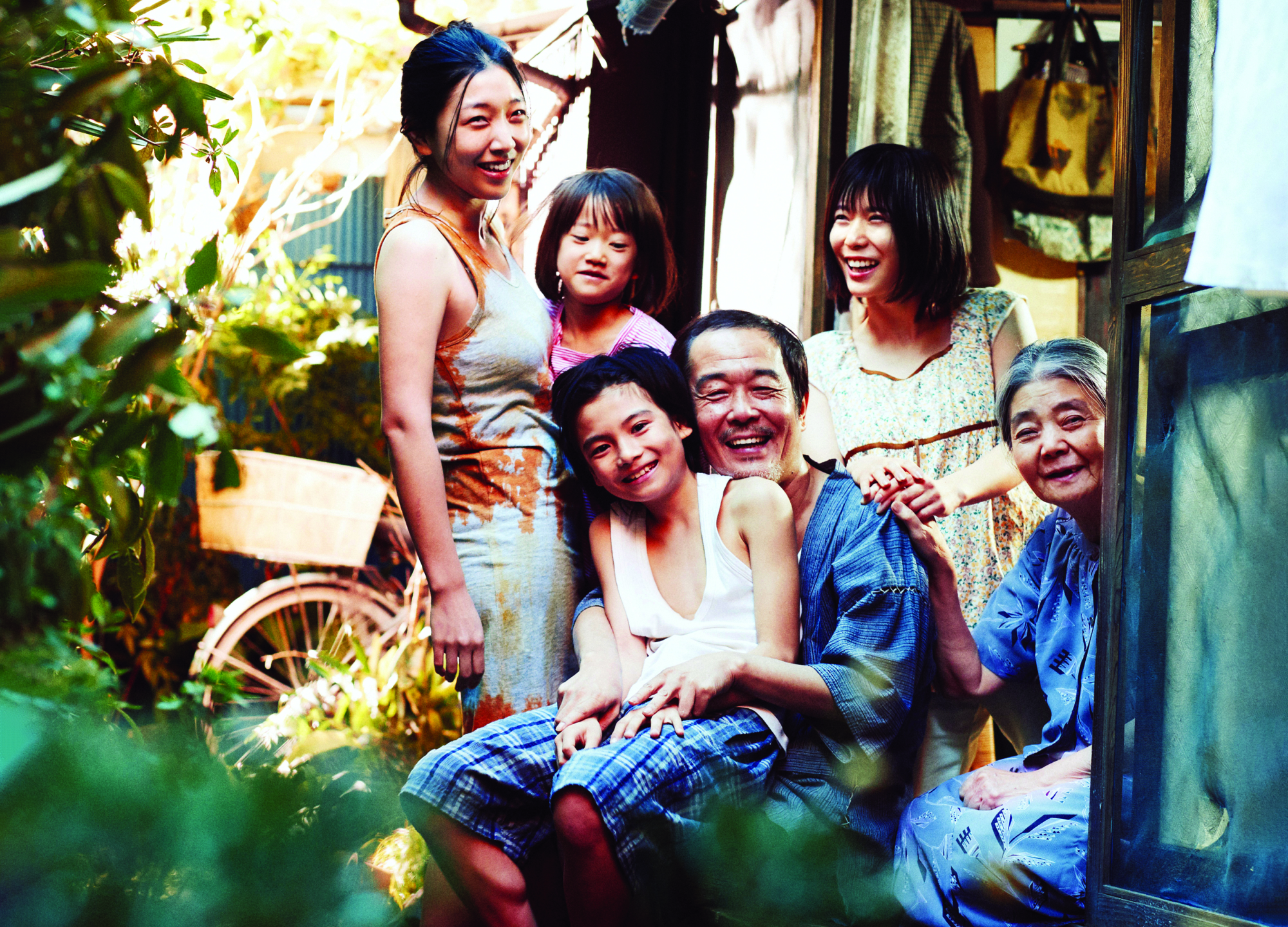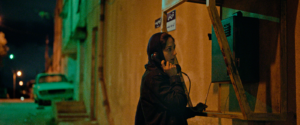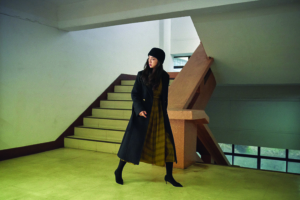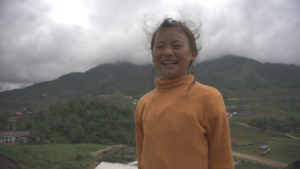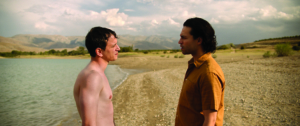When Hirokazu Koreeda won the Palme d’Or – the Cannes Film Festival’s highest prize – in 2018, it was seen as something of a surprise. Not simply due to the fact that Shoplifters, which premiered there, was a modest, humanist picture, but also because it was Koreeda’s thirteenth narrative feature, and a familiar one at that. The director had been in competition at Cannes on four prior occasions – with Distance (2001), Nobody Knows (2004), Like Father, Like Son (2013) and Our Little Sister (2015) – and, of those, only Like Father, Like Son had earned an award, the Jury Prize (though Yūya Yagira, at the time just fourteen, won Best Actor for Nobody Knows). There seemed no reason to suspect Koreeda’s latest trip to Cannes would find a change of fortunes, especially given Shoplifters didn’t embody some bold new direction or unexpected provocation. Instead, it’s the product of a workmanlike filmmaker going about his business, another success for a reliable peddler of auteur-adjacent crowd-pleasers in which simple narratives give way to greater thematic complexities.
Koreeda, born in Tokyo in 1962, is best known – and has most widely practised – as a creator of family dramas. He cut his teeth making documentaries, and his directorial approach for his fiction features is in keeping with this training, working with the mores of social realism and a devotion to vérité (‘In portraying characters, I always try to consider: “What would this person truthfully do in such a situation?”’ Koreeda says. ‘Without any experience in producing documentaries, my work would probably be much more fictional’[1]Hirokazu Koreeda, quoted in Natalie Lorimer, ‘Interview: Hirokazu Kore-eda’, Coney’s Loft, 2 June 2017, <http://www.coneysloft.com/magazine/2017/6/1/interview-hirokazu-kore-eda>, accessed 11 November 2018.). But the dramatic narratives themselves, and the sometimes heavy-handed use of score, tip his pictures towards populist sentimentalism. Nobody Knows, the family drama of his to which Shoplifters is closest kin, is a based-on-a-true-story portrait of a set of siblings abandoned by their mother to rear themselves in a Tokyo apartment. Still Walking (2008), the film to most earn Koreeda’s constant comparisons to legendary Japanese director Yasujirō Ozu,[2]See, for example, Roger Ebert, ‘Still Walking’, RogerEbert.com, 26 August 2009, <https://www.rogerebert.com/reviews/still-walking-2009>; and Peter Bradshaw, ‘Still Walking’, The Guardian, 15 January 2010, <https://www.theguardian.com/film/2010/jan/14/still-walking-review>, both accessed 11 November 2018. recounts the gathering of a family for an annual memorial service on a lost son’s ‘death anniversary’. I Wish (2011) is about a pair of brothers (played by real-life siblings Kōki and Ohshirō Maeda) who’ve been separated in a custody settlement, living, one with each parent, in different cities. Like Father, Like Son explores the eternal nature/nurture debate through that old-as-time dramatic device: two boys – one raised rich, the other raised poor – are discovered to have been switched at birth. Our Little Sister deploys another oft-used dramatic spur – the death of an estranged relative – with three twentysomething siblings meeting their fourteen-year-old half-sister for the first time at the funeral of their birth father. And After the Storm (2016) is a film about a deadbeat dad – a drunken gambler who fails to meet child-support payments – and his relationships with his son, ex-wife, sister and elderly mother.
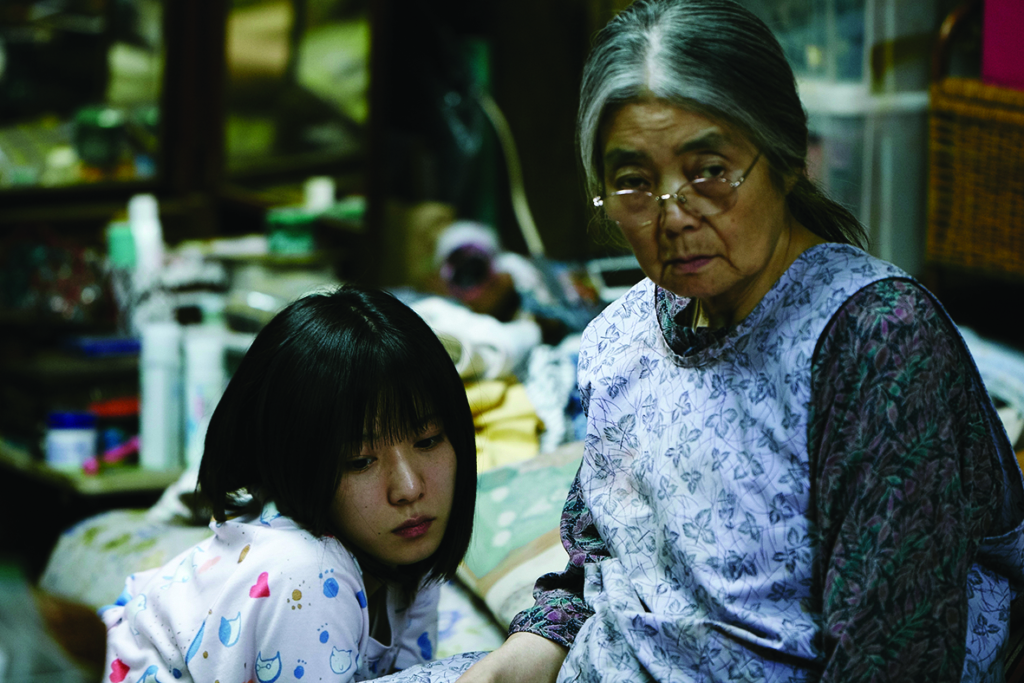
Shoplifters – a film about a ‘found’ family of people who’ve fallen through the cracks of Japanese society – is in keeping with that Koreeda corpus, assuming its place in a body of work that, especially with the recurring presence of actors Lily Franky (who was in four Koreeda pics) and Kirin Kiki (who’s been in six), can sometimes bleed together in memory. You could make a case that Koreeda’s most striking, even his best, films are a pair that take fantastical, sitcom-esque set-ups and mine them for unexpected profundity: After Life (1998), set in a bureaucratic limbo where people have a week to settle on a single memory to take with them to eternity, the whole thing a meditation on storytelling and cinema; and Air Doll (2009), an unexpectedly existential film about a blow-up sex doll that comes to life, her literal emptiness and alienation becoming weighty social symbols of life in the modern metropolis. These aren’t the only outliers in Koreeda’s fiction filmography (I see you, Koreeda completists ready to mention the 2008 on-tour pop-starlet documentary So I Can Be Alright: Cocco’s Endless Journey). Hana (2006) is a quotidian period piece set in the early-eighteenth-century Genroku era, a samurai movie whose premise was worn in the subtitle of its American release title: The Tale of a Reluctant Samurai. And, just prior to Shoplifters, Koreeda made his second foray into genre, the court-case mystery The Third Murder (2017).
Shoplifters – a film about a ‘found’ family of people who’ve fallen through the cracks of Japanese society – is in keeping with that Koreeda corpus, assuming its place in a body of work that … can sometimes bleed together in memory.
His two latest films were made so close together that their releases overlapped, even as they delivered distinct visions from the one director. Whereas Shoplifters brings with it familial familiarity, The Third Murder is the least ‘Koreeda’ film in his catalogue, a slick potboiler – shot in CinemaScope, lit dramatically, full of twists – that pulls viewers along with the revelations of its central murder case. It’s less a whodunnit, more a ‘whydunnit’. In its cold opening, we see Misumi (Kōji Yakusho) club someone over the head with a spanner, set their body ablaze, then gaze upon the flames with a blood-smeared face. When his lawyers – handsome lead Shigemori (Masaharu Fukuyama) and veteran counsel Settsu (Kōtarō Yoshida) – meet him for the first time, he freely admits to committing the murder. The wrinkle, in both legal defence and screen drama, is that Misumi changes his story, and his reasons, constantly. Was it a robbery? An act of revenge? A crime of passion? A paid hit? Different discovered facts cast the case in different lights, with Misumi’s shifting testimony designed – in classic thriller fashion – to leave the audience guessing.
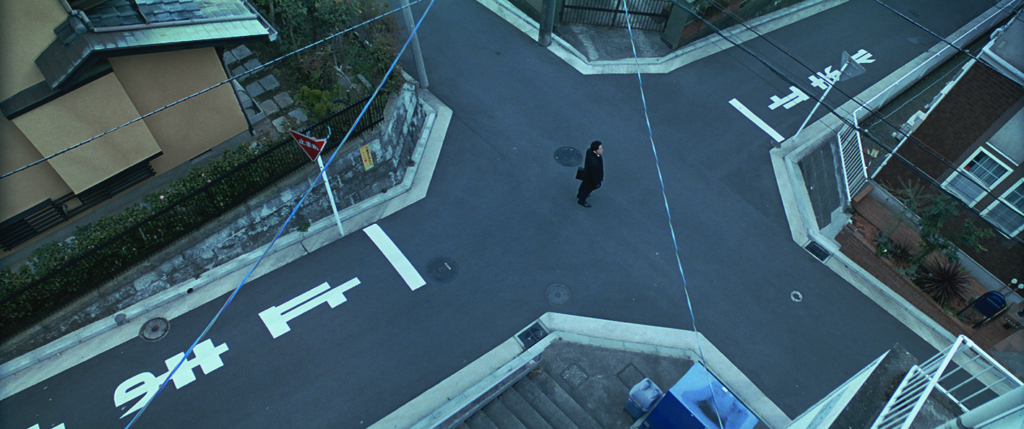
Even as the shifting flashbacks in the film turn it into a kind of one-man Rashōmon (Akira Kurosawa, 1950) – Misumi’s changing stories changing our perception of the crime – The Third Murder does dramatically proceed in pursuit of something akin to truth. But, while the elusiveness of the truth makes for interesting drama, it does lead to peculiarities in prosecution. ‘Hardly anyone says anything real in the courtroom,’ Koreeda offers. ‘Almost everything is decided ahead of time and the truth is found behind the scenes.’[3]Hirokazu Koreeda, quoted in Mark Schilling, ‘Filmmaker Hirokazu Koreeda: “I Wanted to Do Something Different”’, The Japan Times, 7 September 2017, <https://www.japantimes.co.jp/culture/2017/09/07/films/filmmaker-hirokazu-koreeda-wanted-something-different>, accessed 1 November 2018. In the Japanese legal system – with its famously sky-high rates of guilty verdicts, many achieved by railroading suspects and punishing protestations of innocence[4]See Mariko Oi, ‘Japan Crime: Why Do Innocent People Confess?’, BBC News, 2 January 2013, <https://www.bbc.com/news/magazine-20810572>, accessed 11 November 2018. – truth often seems less important than reasserting the supposed infallibility of the system itself. The Third Murder, then, doesn’t have that all-American zeal for cinematic justice, instead progressing as a pure procedural. ‘He has confessed to doing it. Why do you bother?’ offers one of the prosecutors, Shinohara (Mikako Ichikawa), when Shigemori requests to look at evidence. At a briefing, she paints herself as someone who prizes truth over the legal process, but the film itself is more about the latter. Sometimes, there’s due cynicism in this: ‘We’ll never learn what the truth is. That’s why we lean on the most beneficial motive,’ Settsu offers; or, as Misumi says to his legal team, ‘It’s possible you don’t want to know the truth.’
For all its high drama, The Third Murder is about building a case, the legwork of research taking precedence over grand revelations. There’s no ultimate justice – just the heavy burden of weighing up the fate of others, whether as killer or as judge.
Still, Koreeda can see the nobility of doing your job, and doing it rigorously. We see the legal team working long hours and late nights, often eating meals in the office. Shigemori visits the site of the crime, crawls through CCTV footage, and goes to the houses of both Misumi and his victim. To the family of the fallen man – a wife (Yuki Saito) and daughter (Suzu Hirose) who may or may not be tangled up in the crime – Shigemori must, as Misumi’s lawyer, offer a formal apology on behalf of the killer. The presence of the victim’s daughter brings up repressed feelings and regrets about Shigemori’s distant, largely absent relationship with his own daughter (Aju Makita), but it’s also just another one of his duties. For all its high drama, The Third Murder is about building a case, the legwork of research taking precedence over grand revelations. There’s no ultimate justice – just the heavy burden of weighing up the fate of others, whether as killer or as judge. ‘I didn’t want to make a film where a hero appears, solves the mystery, discovers the truth and that leads to a catharsis,’ Koreeda says. ‘I thought it would probably be closest to an actual trial if the hero leaves the courtroom and the audience leaves the theater without the truth being clearly revealed, but feeling that something has been suddenly illuminated.’[5]Koreeda, quoted in Schilling, op. cit.
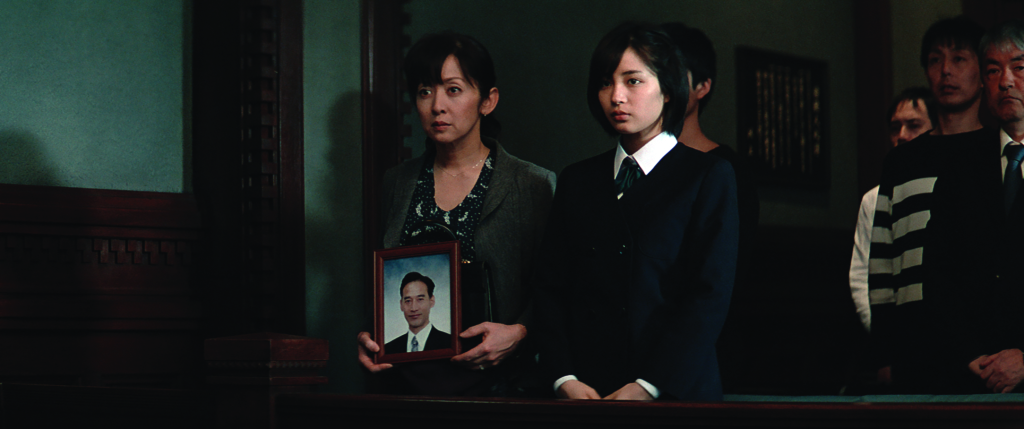
In authoring this film’s script, Koreeda sought to ‘depict the thinking of the people involved in a process that judges human beings’[6]ibid. – even going so far as to gather seven lawyers and have them role-play in mock trails, criminal cross-examinations and adjudications so he could take cues from what they said, how they acted.[7]Ali Chappell, ‘Interview: Hirokazu Koreeda Talks The Third Murder’, ComingSoon.net, 21 September 2017, <http://www.comingsoon.net/horror/features/889413-interview-hirokazu-koreeda-talks-the-third-murder>, accessed 11 November 2018. Along the way, he felt as if he came to understand lawyers and legal trials, but remained bothered by the way definitive black-and-white judgements are arrived at based on a process that leaves a lot of grey areas. ‘They gather only limited information and the judge hands down his verdict based on it,’ Koreeda says. ‘Is it scarier if he actually believes he has arrived at the truth? My honest answer is “yes”.’[8]Koreeda, quoted in Schilling, op. cit. In this, we find something that connects The Third Murder, Koreeda’s most stylistically and dramatically atypical movie, to many of his other features: his use of a central dramatic conflict to examine a broader issue in Japanese society. Perhaps the film’s interrogation of the legal system may play out beneath a sometimes-salacious genre movie, but it’s palpable, and persists to the end.
In turn, Shoplifters wears its social-realist societal commentary – and its heart – on its sleeve. It’s a critique of the failure of the Japanese welfare system smuggled into a warm-hearted movie about a makeshift domestic unit whose members fulfil recognisable roles: ‘grandmother’ Hatsue (Kiki), ‘father’ Osamu (Franky), ‘mother’ Nobuyo (Sakura Ando), ‘elder daughter’ Aki (Mayu Matsuoka), ‘son’ Shota (Kairi Jyo) and newly adopted ‘youngest’ Yuri (Miyu Sasaki). They’re, at first blush, the ‘Shibata’ family, living in a chaotic domicile in a downtrodden Tokyo neighbourhood. But, we soon discover, they’re unrelated: the father and mother may be married, but none of the children are their own, and the grand matriarch is the mother of neither. Instead, this gathered clan is living in her home and off her pension, Osamu and Nobuyo doing tenuous cash-in-hand work to add to the meagre pot. The children were abandoned, abused or runaways ‘informally’ adopted into the unit, the mutually beneficial arrangement providing company, emotional reassurance or parental figures, as needed. They’re living outside the law in a lawful society, the title referring to the family practice of stealing groceries while also echoing the way conservatives tend to think of those on welfare as subsistence thieves.
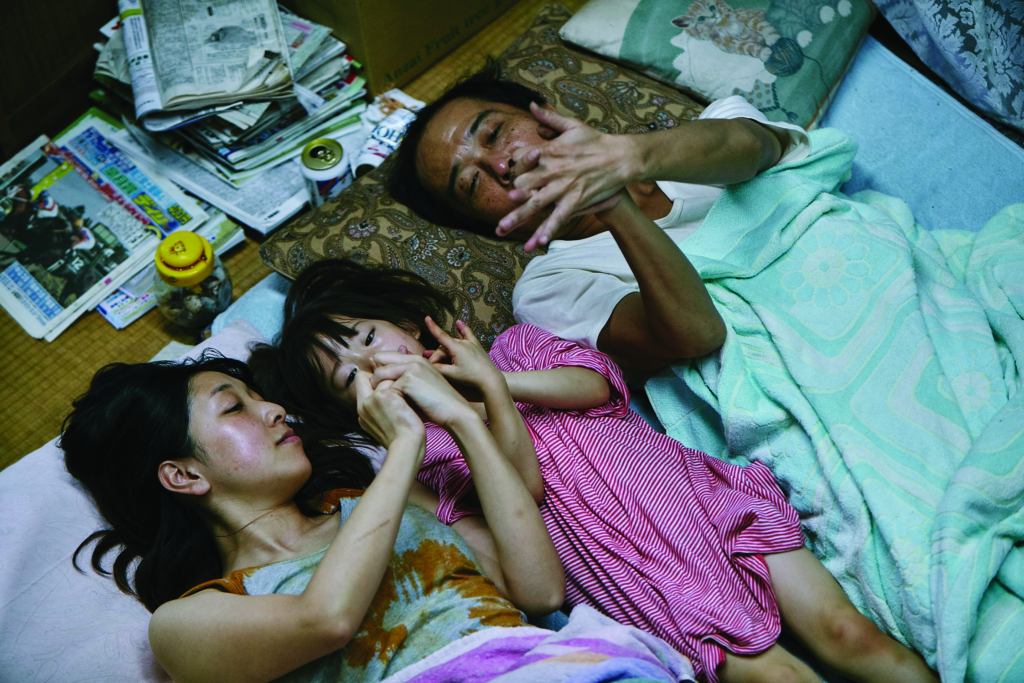
In Still Walking, Our Little Sister and After the Storm, Koreeda observed the family unit as broader whole, taking particular interest in dynamics between generations and how the individual can be both a part of and apart from the group. In Nobody Knows and I Wish, the director also explored the bond between siblings, how they see the world and their own kinship. In Shoplifters, he again addresses these themes, only through the prism of an adoptive, ad hoc family, in turn furthering the ideas of nature/nurture he explored in Like Father, Like Son. ‘[B]lood ties [are] something that we put a lot of importance on in Japanese society’, Koreeda says. ‘I wanted to question that by examining different kinds of bonds other than blood.’[9]Hirokazu Koreeda, quoted in Liz Shackleton, ‘Palme d’Or Winner Hirokazu Kore-eda on the Family Ties That Inspired Shoplifters’, Screen Daily, 21 May 2018, <https://www.screendaily.com/features/palme-dor-winner-hirokazu-kore-eda-on-the-family-ties-that-inspired-shoplifters/5129549.article>, accessed 11 November 2018.
For much of Shoplifters’ generous 121-minute running time, Koreeda revels in the intimacy of his family unit, frequently contrasting that with the coldness of society itself – something shown in the lack of empathy from employers or, especially, in the way Aki works as a hostess and peep-show dancer, often kept divided from clients by plexiglass. After the film begins in the winter months – upon the initial ‘adoption’ of young Yuri – the Shibatas’ familial warmth soon becomes symbolised by meteorological warmth: Shoplifters moving forward into sweaty summer months when the kids play happily, Osamu and Nobuyo break a long sexual drought, Aki physically connects with a client (‘It’s warm together,’ she says, when they press against each other), and the whole family takes a trip to the beach. This day at the beach is presented in such shades of sun-dappled joy, it’s like one of the chosen happy memories from After Life acted out: there’s classic father–son bonding, the thrill of Yuri’s first trip to see the sea, and a moment in which Hatsue watches the whole clan holding hands, frolicking in the shallow waves. In familiar dramatic fashion, this is a final moment of peace at the end of a long life: that night, perhaps no longer fearing dying alone, Hatsue passes away. There’s poignancy there, but the moment marks a radical, irrevocable change in the film – the first fissure in the family unit.
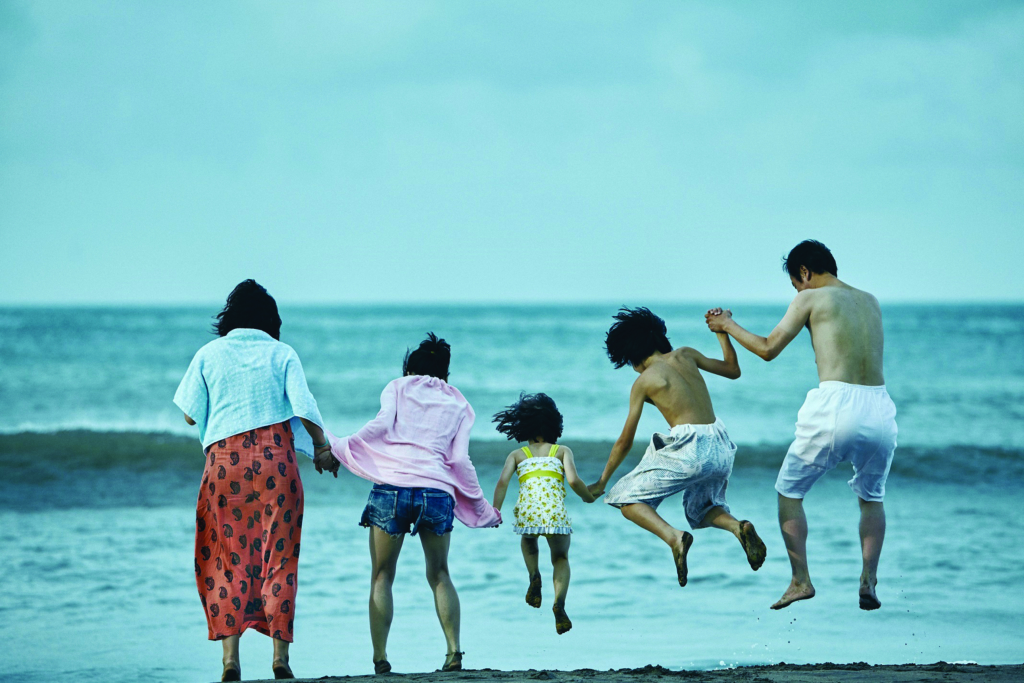
Given they’re living together illegally, and still need to keep receiving her pension, the family can’t call an ambulance or report Hatsue’s death; instead, they bury her under the floor, scooping out the dirt with pots and pans. ‘I can’t believe we’re burying another one,’ Osamu says, which suggests that he and his wife may have undertaken a previous pension-scam with another old lady who didn’t want to die alone. ‘Grandma’s amazing – she keeps helping us out after she’s died!’ marvels Nobuyo, lovingly, when she discovers the dearly departed’s secret stash of cash. But such good times can’t last. The sham family are eventually discovered, arrested, made the centre of a media storm. The people we’ve known as caring parents are reframed as con artists, killers, kidnappers. Yuri is returned to the abusive parents who didn’t care much when she went missing, Shoplifters another film – like Nobody Knows – through which Koreeda indicts those members of society who see children as burdens and shirk the responsibility of raising them.
For all the accessibility and crowd-pleasery of his stories, Koreeda never delivers closed narratives, refusing to end with tidy resolutions. Problems aren’t solved, families aren’t reunited, a status quo doesn’t set in … where a film begins and ends is part of a larger continuum.
In an emotional finale that edges close to grandstanding, Nobuyo is giving a deposition, responding to police inquiries about the supposed inhumanity of her crimes. To them, and the ever-hysterical media, she is a child thief, but she remains defiant. She’s told she’s never really been a mother because she’s never given birth, but she dismisses the sentiment outright: ‘Giving birth automatically makes you a mother?’ The director reminds us there’s something far more noble in taking abandoned children and committing to their daily care – framing her face-on, staring down the camera’s lens, her gaze never wavering. Her eyes meet ours – viewers, especially those in Japan, made complicit in the social conditions depicted. Nobuyo ends up ‘taking the rap’ so that the rest of the family can go free, and Shoplifters ends back in the cold of winter: Osamu and Shota building a snowman, the latter on leave from his new foster family, giddy about a sleepover with his former father figure. The scene marks the ultimate demise of the family unit, a final night of togetherness: ‘From now on, I’m not your dad,’ Osamu says, the line hanging as heavy as the sentiment. The film’s final shot lingers without any sense of finality, though: Yuri, back in her old home, sits on the balcony where she first met Osamu and Shota, her biological parents once more fighting inside, negligent to the last. When she hears a noise, she peers out expectantly: Is there something, someone, there? Or is she just hopeful?
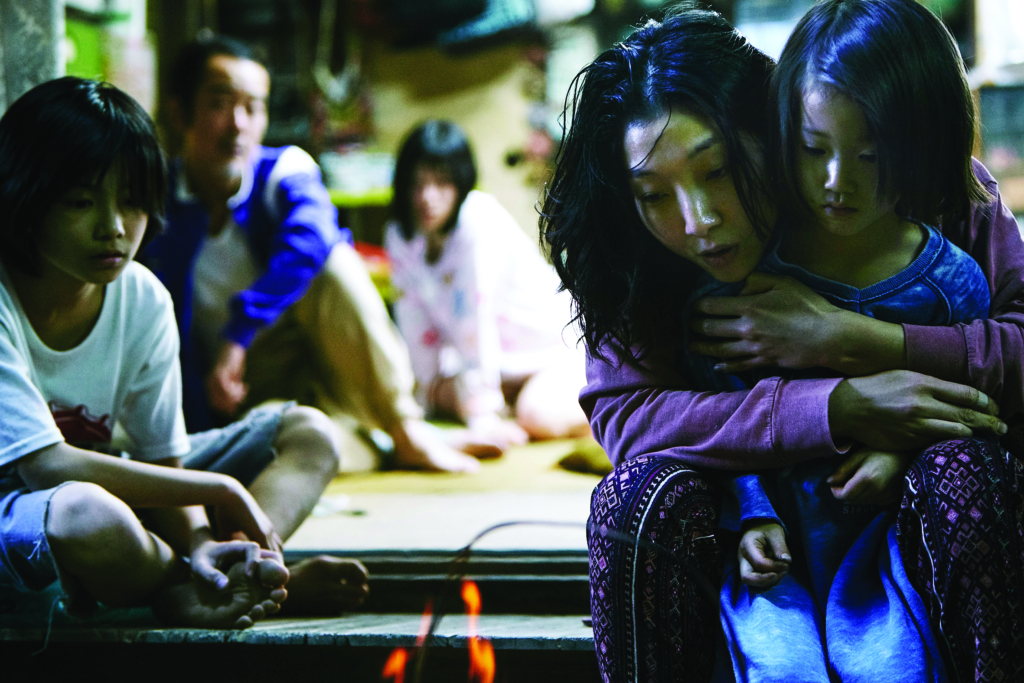
This shot means that Shoplifters feels open-ended, alludes to a future past its credit roll. For all the accessibility and crowd-pleasery of his stories, Koreeda never delivers closed narratives, refusing to end with tidy resolutions. Problems aren’t solved, families aren’t reunited, a status quo doesn’t set in; instead, he leaves off with moments always hinting at something beyond. Having started out making documentaries, and working within the social-realist tradition, the filmmaker knows that where a film begins and ends is part of a larger continuum, life existing before a story starts and going on after it finishes.
Even The Third Murder, with the in-built finale of a judge’s verdict, leaves off with its own ambiguous, symbolic final shot. With the case that’s been at the centre of his life abruptly over, Shigemori stands at a literal crossroads. Rather than choosing a direction, though, he’s paralysed, gazing up at the complex, entangled web of overhead wires above him. ‘[L]ife is never simple,’ Koreeda offers. ‘Producing a narrative that is easy to understand is not important. Rather, I believe we have to pass on that something that apparently seems simple is indeed complicated.’[10]Hirokazu Koreeda, quoted in Noriki Ishitobi, ‘Cannes Winner Kore-eda Says He Will Not Give In to Public Criticism’, The Asahi Shimbun, 20 July 2018, <http://www.asahi.com/ajw/articles/AJ201807200003.html>, accessed 11 November 2018.
Endnotes
| 1 | Hirokazu Koreeda, quoted in Natalie Lorimer, ‘Interview: Hirokazu Kore-eda’, Coney’s Loft, 2 June 2017, <http://www.coneysloft.com/magazine/2017/6/1/interview-hirokazu-kore-eda>, accessed 11 November 2018. |
|---|---|
| 2 | See, for example, Roger Ebert, ‘Still Walking’, RogerEbert.com, 26 August 2009, <https://www.rogerebert.com/reviews/still-walking-2009>; and Peter Bradshaw, ‘Still Walking’, The Guardian, 15 January 2010, <https://www.theguardian.com/film/2010/jan/14/still-walking-review>, both accessed 11 November 2018. |
| 3 | Hirokazu Koreeda, quoted in Mark Schilling, ‘Filmmaker Hirokazu Koreeda: “I Wanted to Do Something Different”’, The Japan Times, 7 September 2017, <https://www.japantimes.co.jp/culture/2017/09/07/films/filmmaker-hirokazu-koreeda-wanted-something-different>, accessed 1 November 2018. |
| 4 | See Mariko Oi, ‘Japan Crime: Why Do Innocent People Confess?’, BBC News, 2 January 2013, <https://www.bbc.com/news/magazine-20810572>, accessed 11 November 2018. |
| 5 | Koreeda, quoted in Schilling, op. cit. |
| 6 | ibid. |
| 7 | Ali Chappell, ‘Interview: Hirokazu Koreeda Talks The Third Murder’, ComingSoon.net, 21 September 2017, <http://www.comingsoon.net/horror/features/889413-interview-hirokazu-koreeda-talks-the-third-murder>, accessed 11 November 2018. |
| 8 | Koreeda, quoted in Schilling, op. cit. |
| 9 | Hirokazu Koreeda, quoted in Liz Shackleton, ‘Palme d’Or Winner Hirokazu Kore-eda on the Family Ties That Inspired Shoplifters’, Screen Daily, 21 May 2018, <https://www.screendaily.com/features/palme-dor-winner-hirokazu-kore-eda-on-the-family-ties-that-inspired-shoplifters/5129549.article>, accessed 11 November 2018. |
| 10 | Hirokazu Koreeda, quoted in Noriki Ishitobi, ‘Cannes Winner Kore-eda Says He Will Not Give In to Public Criticism’, The Asahi Shimbun, 20 July 2018, <http://www.asahi.com/ajw/articles/AJ201807200003.html>, accessed 11 November 2018. |
